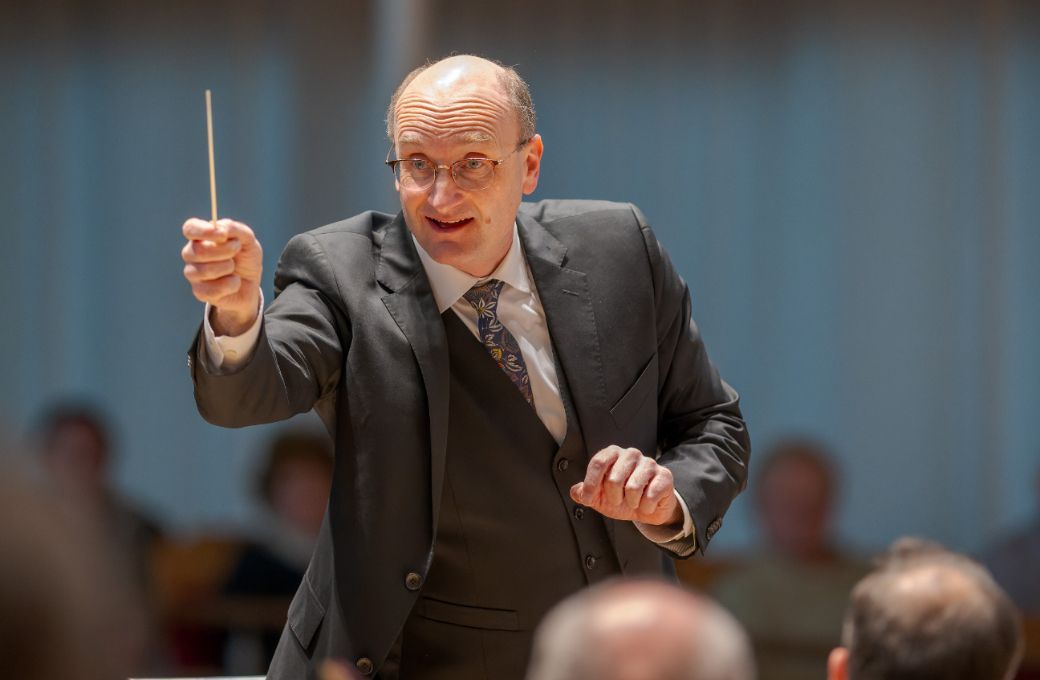Fauré wrote that his Requiem was “from beginning to end, a very human feeling of faith in eternal rest”. The work’s consoling spirituality is popular, drawing the listeners in, leaving them in a personal deeper peace. The Scottish Chamber Orchestra and SCO Chorus wisely left the transcendent to the end in a concert of English music bookended by French.

Berlioz looked to Shakespeare’s Much Ado about Nothing for an opera project resulting in the two-act comedy Béatrice et Bénédict. The sparkling overture opens with boisterous music from the final wedding scene, the four horns and double woodwinds bulking up the fun. In the quieter episodes, the violins shimmered delightfully in the nocturnal theme, quiet horns adding atmosphere. Andrew Manze, Principal Guest Conductor, notched up the excitement as the trombones became boisterous.
Ruth Gipps was a pupil of Vaughan Williams, evident in her short impression for string orchestra Cringlemire Garden which was inspired by the Lake District. Like her tutor, she was influenced by folk tunes which decorate this very pastoral idyll, Manze guiding the music as the strings wove an intricate tapestry around restful cello and viola solos. Like a breeze picking up, the music became brighter and more rhythmically defined before the folk tunes died away to a final double bass. Gipps is a neglected composer but on hearing this short piece, surely more of her work deserve to be programmed.
The English pastoral mood continued with Vaughan Williams' Five Mystical Songs, a setting of George Herbert’s devotional verse for baritone, orchestra and choir. This music fits Roderick Williams’ baritone like a comfortable glove, his smooth warmth bringing a wistful edge to the songs. Easter had a luminous quality, its harmonies reminiscent of the Sea Symphony, premiered the year before. I Got Me Flowers was a gentle piece with harp illustration and chorus on humming duty over Williams’ silky baritone. Love bade me Welcome is the spiritual heart, with rich orchestration and lovely oboe adding colour, the seated chorus adding quiet plainchant while The Call was really a folk song, Manze moving it along as Williams completely inhabited its radiance. A final blast for chorus and orchestra in the Antiphon Let all the world in every corner sing was majestic.
As organist and choirmaster of La Madeleine in Paris, Fauré knew the funeral music by heart and wanted something better to encompass peace and consolation. This well-known work hits the spiritual mark perfectly, but it was a treat to hear this orchestral version with its rich sound. Manze chose reduced forces, section leaders Su-a Lee and Jessica Beetson prominent in the placing choice of cellos to the right, violas to the left giving justified prominence to the mellow and warm divisi passages that so characterise the work. Chorus Director Gregory Batsleer had prepared his singers meticulously, the intense solemn Introit perfectly phrased and balanced. Manze controlled the pace in the Offertoire beginning from hushed dense strings, the unaccompanied singers casting a wondrous spell before Williams sensitive Hostias. The detail in the Sanctus was meticulous with atmospheric broken chords on the harp before the Hosanna broke out, strings on resolute downbows, chorus in big balanced voice. Placing soprano Julia Doyle up beside the organ was perhaps looking to achieve an ethereal sound, her Pie Jesu rather distanced. Williams sang the Libera me beautifully, the unison chorus and gently rocking beat mesmerising. Michael Bawtree’s tasteful organ registrations enhanced the work’s drama throughout, his In Paradisum decoration spiritual. It is an intensely moving work, and heard this way, the deeper peace was accentuated.


